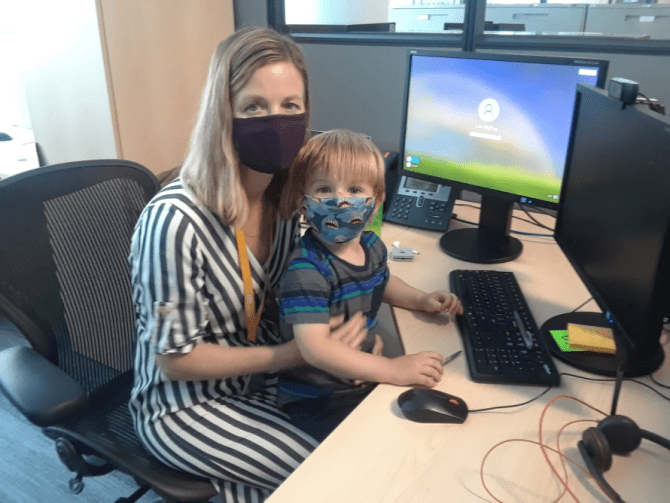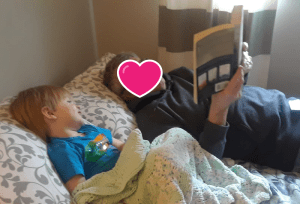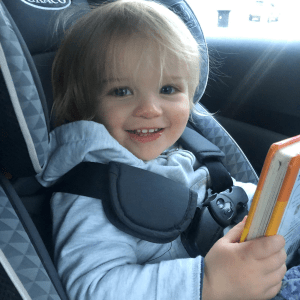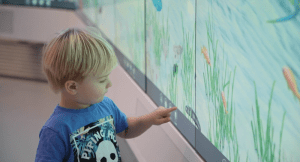Lori Blahey is a former Senior Marketing Consultant at EPL.

Today is my last day at EPL. For three years, I have worked as the Senior Marketing Consultant supporting our library services for children. While I’ve learned so much, these are the nine lessons I will take with me as I raise my now four-year-old son. I hope they help you as much as they’ve helped me.
1. Talking to children helps their brain develop.
The idea of talking to babies is not new. Yet, it wasn’t until I wrote about babies’ brain development that I understood the science behind why language is so important. Local data shows that premature babies have a higher risk of language and learning challenges compared to babies born full term.1 Brain maps also show physical differences in the surface of their brains.2 Why? Babies born to term spend the third trimester listening to their mother. Preemies are hearing noises in the NICU. The research is clear: language builds healthy brains.
Combine this information with the fact that a child’s brain is 90% developed by the time they turn five and it’s obvious the early years set the foundation for a child’s life path. Fascinating, yes, and scary, too. The good news? No matter your child’s age, you can always start talking to them. It costs nothing and can change their life.
2. Reading with your child is the single best way for them to develop the skills to become a good reader.
Parents are a child’s first and best teacher so what you do at home matters. If you want your child to be a good reader, you need to establish a daily reading habit. This helps your child develop early literacy skills—these are the skills they’ll need to be able to learn to read and write, which happens around age five. It includes everything they have seen and heard about books, language and print.
No books at home? No problem. Read anything with words whether it be a magazine, the back of a cereal box or signs you see when you're outside for a walk.
3. Children are never too old to hear a good story.
Did you know that adults should continue reading out loud to their school-aged kids, even teenagers? Yeah, me neither.
Educator, Jim Trelease has this to say:
All the reasons we read to young children—the gift of uninterrupted time, the message the reading is valued, and the shared experience of responding to a book together—are the very same reasons we should continue reading aloud to teenagers.3
Why is reading out loud to older kids important? As children age, they see reading more as work, since it’s often tied to book reports and assignments. Reading together reminds kids that reading is fun, which motivates them to read on their own. Win-win.
If you’re looking for a fun way to read out loud as a family, run your own family book club! All you need is a shared book and lots of discussion (snacks and cuddles are highly recommended).
4. The ability to read is critical to learning just about anything.
Research shows children who are poor readers by the end of Grade 3 are unlikely to graduate high school.4 Put another way, around Grade 4, kids go from learning to read to reading TO learn. In short: if a child can’t read, they also can’t learn science, math, history, how to solve problems, analyze information and more.
That’s why becoming a good reader isn’t just about enjoying books. It’s about developing strong language and reading skills that lead to better grades in schools, better job prospects, higher income potential and a happier and healthier life.5
5. Repetition helps children learn.
We all know kids like to repeat their favourite things. Turns out what is frustrating for parents is helping children learn.
Here’s how one of our Community Librarians explained it to me:
The first time they hear a rhyme or song, kids listen. The second time, they recognize what you said. The third time, they are anticipating what will happen. The more times a child is exposed to a song or story, the more opportunities you give them to think about it and create their own level of understanding.
Knowing this, I’m much more relaxed about re-reading the same books. When my son gets a new book from the Library, I expect we’ll read it at least two times in a row. What was once frustrating is now comforting—through repetition, I know I’m contributing to my son’s learning.
6. Singing is magic.
One of our Youth Services Librarians (that’s a librarian dedicated to children’s services and we have six!) is fanatical about the magic of singing to children. She convinced me and I’m here to do the same. Why? Because singing calms. It captures their attention. It distracts. Singing also helps children develop early literacy skills.
The best part about singing is you don’t need to have a beautiful voice (kids don’t care) or to know many songs (see my point about repetition above). Most days I sing the same three songs and change the lyrics based on what we’re doing. For example, Baby Put Your Pants On becomes “Baby time to brush your teeth” or “Baby please get in the car”. If you’ve got a little one at home, try Changing Diapers—it’s a game changer.
7. Play teaches children new words (and more).
Like reading and talking, play also has a special place in a child’s development. While it may not look like much to adults, kids learn so much through play—including language.
When I first joined EPL, I didn’t understand this concept. Thankfully, the lightbulb went off one day when I was playing with my young son and heard myself saying things like:
“What should we play with today? Balls or blocks? Ok, let’s grab the blue ball over there. I know you love the colour blue.”
On and on I went, unconsciously teaching my son new words and how conversation works. That day was an important lesson in the power of play to teach, and a reminder of the impact adults can have on their child’s development, simply by spending time with them.
8. Books are excellent teachers.
My time at EPL has shown me that books can do more than entertain children. They have an innate ability to teach, comfort and explain in a way that is just right for little kids. Stories help kids feel less alone in their experiences, process their feelings and gain perspective on how to approach their own difficult situations in real life. They can also open the door for important conversations between parent and child.
The next time you’re faced with a tough topic—racism, war, consent or life events such as death, moving or starting school—rest assured there’s a book for that.
9. Screen time is ok, but there are better ways to embrace it.
Technology is a fact of life and kids need to know how to use it safely and effectively as part of their education, career and life. That’s why every EPL location provides access to technology (including early literacy iPads in the children’s section, free WiFi and robots and other cool equipment) and classes where kids get to develop digital literacy skills.
At home, technology can be a helpful tool for children, and parents too! While this is a tricky topic (particularly coming out of a pandemic where we all watched too much TV), here are some tips to make the most of screen time:
- Consume media together. When you can, watch with your child. That way you can ask questions and talk about what’s on screen. This makes TV time more interactive and engaging your kids—and might even contribute to their learning!
- Consume better media. Aim for TV shows and apps that are high on entertainment and here are a few EPL Picks for quality streaming TV shows and a list of apps on our own early literacy iPads.
- Turn the TV off when not in use. When your child is starting to learn new words, they are looking to you—specifically, your face—to figure out how to say the word. A TV in the background is a distraction and can cause confusion.
As a final goodbye gift, I made us a present. A page just for parents (or any adult who cares for children at home) that will help you navigate the big, beautiful world of EPL. The Library’s goal is, and always has been, to support families and help every single child reach their full potential. I hope you bookmark this page and come back often—EPL staff are always working on incredible things you don’t want to miss.
Author's note: If the title sounds vaguely familiar, it's because I borrowed from Terry O'Reilly's This I Know: Marketing Lessons From Under the Influence. Terry was a speaker for EPL's Forward Thinking Speaker series so I had to read the book. I loved it, hence the inspiration for this article.
References
- Three-year speech assessment data from 234 pre-term babies born between 2009-2013 who visited the Glenrose Rehabilitation Hospital in Edmonton for follow up visits between 2012-2016.
- Engelhardt, Erin & Inder, Terrie & Alexopoulos, Dimitrios & Dierker, Donna & Hill, Jason & Van Essen, David & Neil, Jeffrey. (2014). Regional Impairments of Cortical Folding in Premature Infants. Annals of Neurology. 77. 10.1002/ana.24313. Retrieved from https://www.ncbi.nlm.nih.gov/pmc/articles/PMC4324979/.
- Giorgis, Cyndi, editor. Jim Trelease's Read-Aloud Book. 8th ed., Penguin Books, 2017, p. 37.
- Annie E. Casey Foundation. (2010). Early Warning! Why Reading by the End of Third Grade Matters: A KIDS COUNT Special Report from the Annie E. Casey Foundation. Baltimore, MD: Fiester, L., Smith, R., & Annie E. Casey Foundation. Retrieved from https://www.aecf.org/resources/early-warning-why-reading-by-the-end-of-third-grade-matters/
- Zauche, Lauren & Darcy Mahoney, Ashley & Zauche, Michael Stapel-Wax, Jennifer. (2017). The Power of Language Nutrition for Children’s Brain Development, Health, and Future Academic Achievement. Journal of Pediatric Health Care. Volume 31 Number 4. 493-503. Retrieved from https://www.jpedhc.org/article/S0891-5245(16)30311-X/fulltext.





Add a comment to: This I Know: Parenting Lessons from My Time at EPL